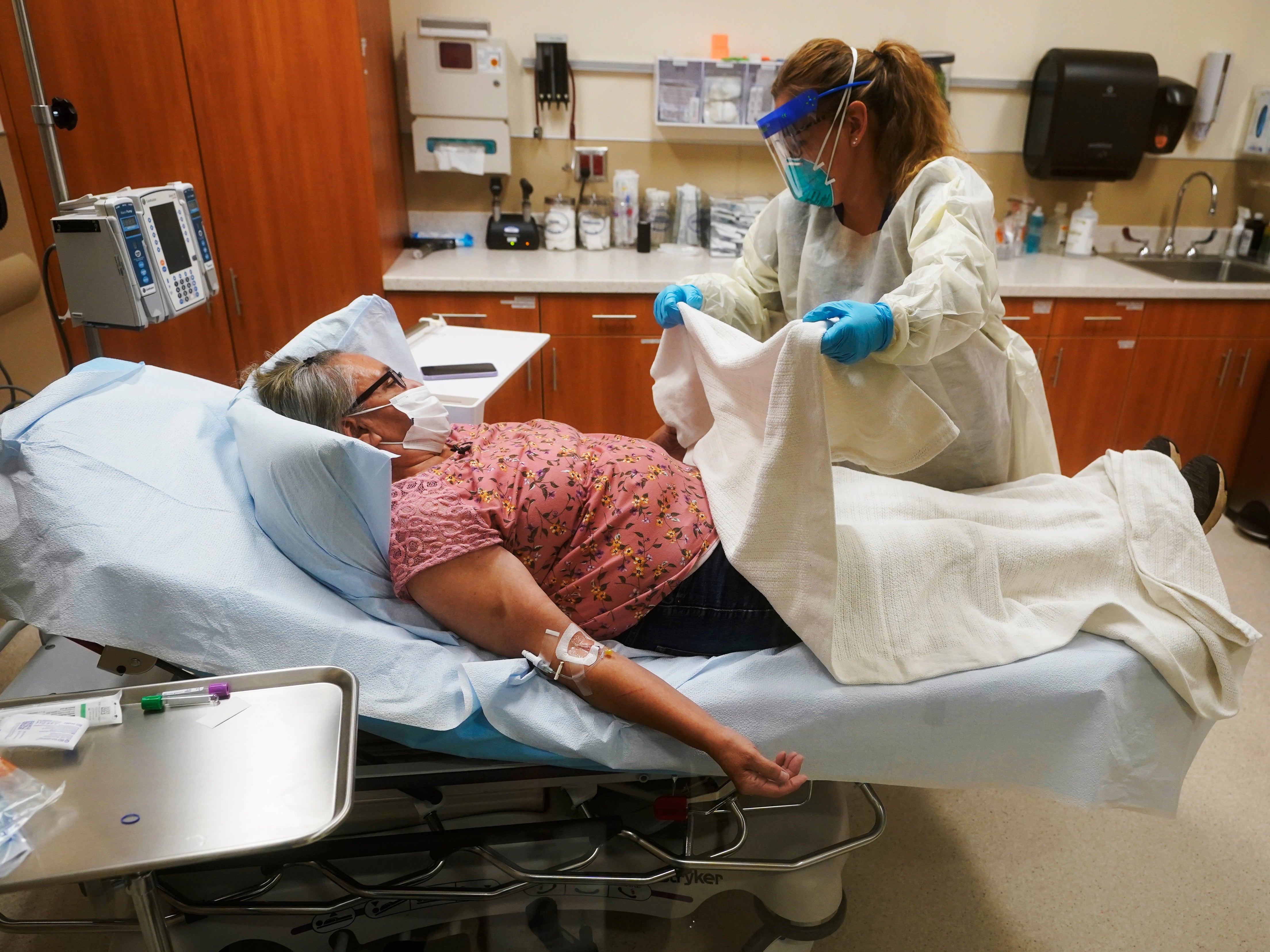As an Alaskan, I know why my state was hit so hard by the latest Covid wave
The 49th state’s spirit of independence and self-reliance has backfired – in defiance of native traditions that put mutual obligation and community first


There’s a reason that Alaska is dubbed the “Last Frontier.” Growing up in Alaska, I noticed that trends tended to arrive on our glacial shores last of all. We were the last state to receive electric cars, to erect a Costco, and to phase out the mullet. And the same proved true when a certain novel virus came out.
In spring 2020, when New York hospitals became inundated with Covid-19 patients, Alaska had not registered a single case. But now, in fall 2021, our state leads the nation in coronavirus hospitalizations. Within the last two weeks of September, one out of every 84 Alaskans tested positive for the virus; the second highest rate was recorded in West Virginia, where one in every 164 people tested positive.
ICU beds in Alaska’s largest cities have reached capacity. The state activated crisis standards of care protocols, allowing healthcare facilities to ration care if needed. Alaska’s chief medical officer stitched up a patient’s lacerated foot while sitting on the floor in the hallway. Doctors in Anchorage’s Providence Hospital now must decide who will receive care and who will not. Recently, they were forced to turn away a patient medevaced in from a rural community, and that patient later died.
Yet not so long ago, due to strong partnerships with state and tribal leaders, Alaska initially led the nation in vaccinations. So how did Alaska accelerate so far into the purple?
Cold weather and testing accessibility notwithstanding, I believe Alaskans’ fetishization of independence led to the surge. Proudly self-reliant, many in the Last Frontier still hunt, fish, grow and gather their own food, fell trees to heat their homes, and live off the grid. Alaskans never think twice about helping dig out a stranger’s car in a snowstorm, but at the end of the day, many just want to be left alone (as indicated by the preponderance of “KEEP OUT” signs).
A nostalgic rural masculinity, one that remains dominant even in urban spaces, has led many Alaskans to value independence over communal responsibility. This is evident in how they vote (conservative), electing a Republican governor who continues to thwart all efforts to issue a statewide mask mandate, as well as vocal pushback against mask and vaccine mandates. Only 51 percent of Alaskans have received the full round of Covid-19 immunizations, and much of the population lives in areas without mask requirements.
American author Marcus Sakey once said that Alaskans are “incredibly friendly, interesting, smart people – but they also stay out of each other’s business.” As a child I recall an oft repeated saying: Most people who come to Alaska are running away from something. It wasn’t always like that, however. Alaskan Indigenous traditions have long valued collective wellbeing over individualism. According to a study by Urban Indian Health Institute, 75% of Alaska Natives and American Indians believe that getting vaccinated is their responsibility to their community. In 2021, vaccine rates among Alaskan Natives hit record highs.
Native Alaskan traditions of centering community are also reflected in Alaskan Indigenous fine art. For example, the Chilkat Protector Mask created by Tlingit artist and weaver Lily Hope “serves as a modified record of how we took care of one another during this time.” Hope explains that just as Tlingit, Haida, and Tsimshian cultures traditionally shared in the hunt, harvest, childcare, and housing, wearing a mask “is an expression of care for our vulnerable, our families, and our communities.”
However, Anchorage citizens recently elected a mayor who opposed Covid-19 shutdowns and mask mandates. One Alaskan I spoke with expressed his opinion that individuals should make their own choice to mask or vaccinate. He also felt that masking in schools inflicted more harm than good. “Children need to see facial expressions,” he said, and he believes that the science behind masking is debatable. (The CDC has concluded that masking effectively reduces Coronavirus infection and transmission, and WebMD has stated that masking is perfectly safe for children.)
Then there is the matter of widespread distrust. Alaskans’ sour history with outside special interests has led to suspicion of outsiders, “intellectual elitists,” and by extension, the medical community. Three-quarters of vaccine-hesitant Alaskans indicated in a survey that they primarily trust family and friends for information on Covid-19 over medical experts, furthering the spread of disinformation. In all fairness, however, most people tend to adopt values and beliefs that align more closely with those they identify with and admire.
Some Alaskans assert that natural immunity is a stronger prevention from Covid-19 than a vaccine. One Juneau school board candidate advocated for “herd immunity” and “natural selection” in lieu of schoolwide masking.
As snow and cold rain begin to fall, more people are socializing indoors unmasked, prompting more viral spread. Friends who live in Anchorage worry that their young unvaccinated children will contract Covid-19. One described a recent encounter with a neighbor who became so sick with the Delta variant that she “almost lost the will to live.” When my friend asked the neighbor if she regretted not vaccinating, the neighbor replied, “Absolutely not!”
Gratefully, Anchorage schools have implemented masking requirements, although Alaskan Parents for Children’s Right to Breathe has been coordinating efforts to protest these mandates. Ironic, considering that eliminating mask requirements could lead to more Covid spread and result in respiratory problems and/or possible long term lung damage.
Alaskans who value their individual freedoms over the health of their community and head indoors as temperatures dip will continue to see an increase in Covid-19 cases. It’s time for the Last Frontier to follow the example of Alaskan Native traditions and put our communities first.

Join our commenting forum
Join thought-provoking conversations, follow other Independent readers and see their replies